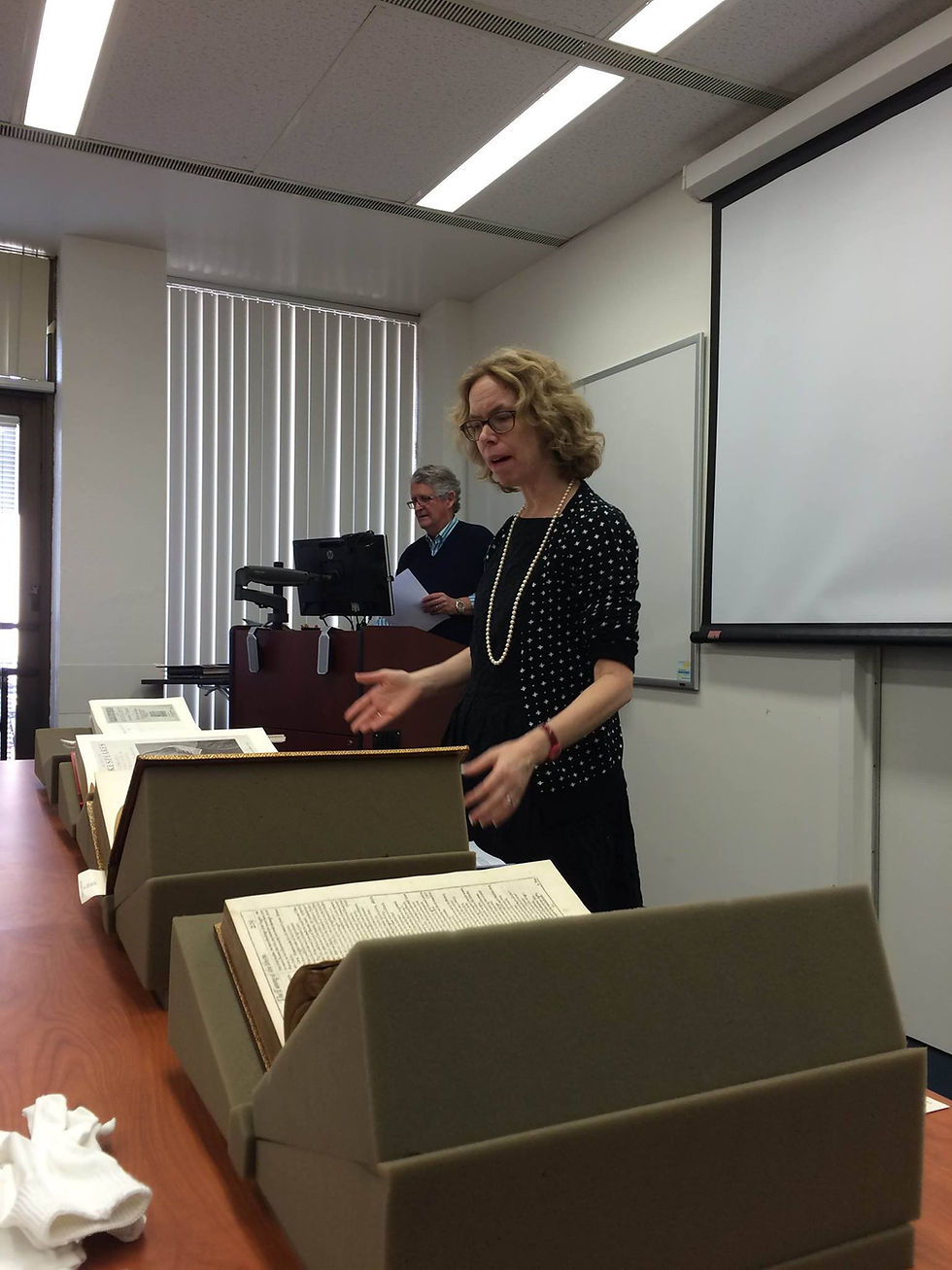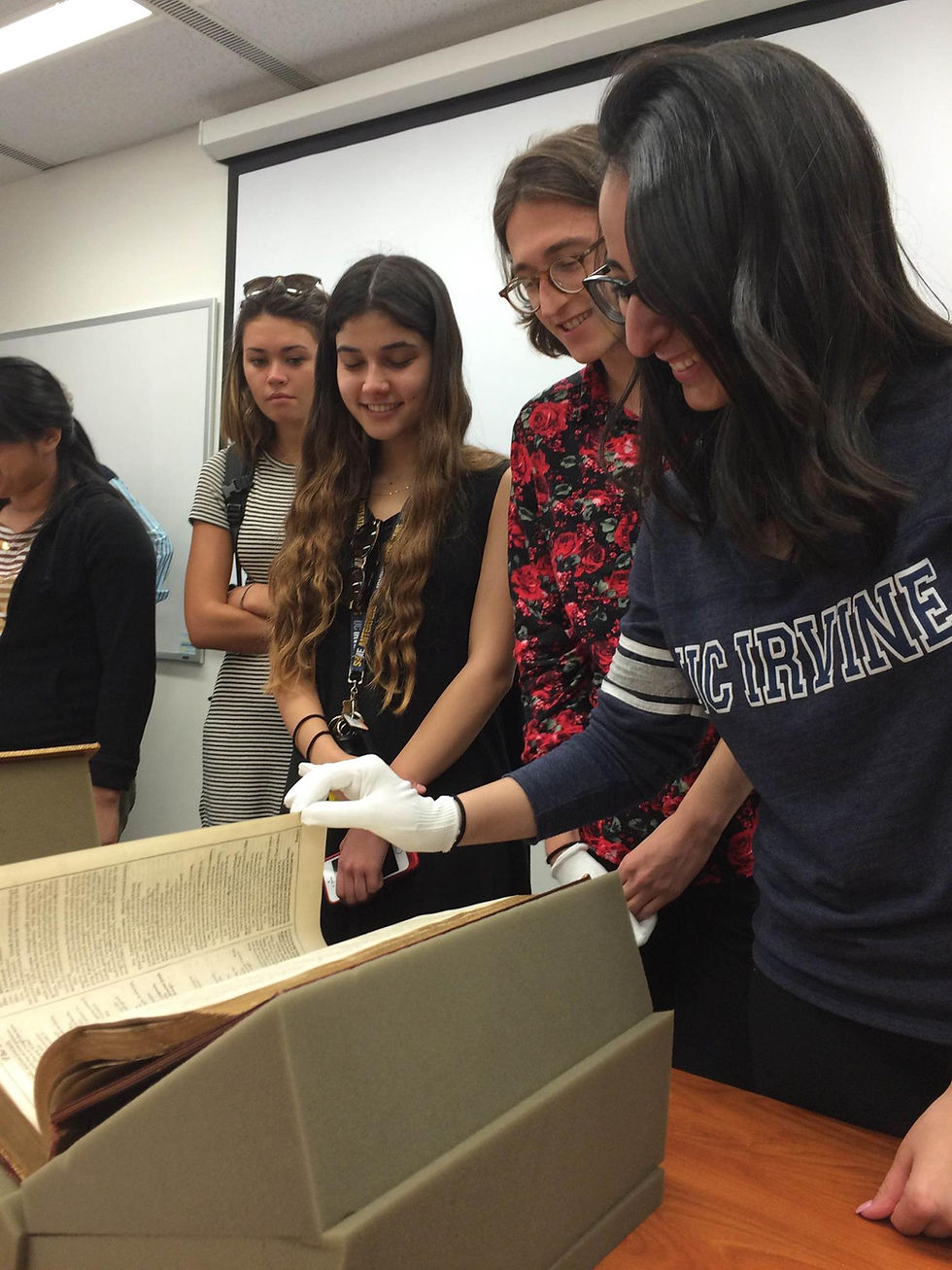Taking Out the White Gloves and Flipping Through the Folios
- Marijune Sia
- Mar 12, 2016
- 3 min read
Photos courtesy of Rachel Heinsen
A group of anxious University of California, Irvine students huddled over a Shakespearean artifact valued at around $240,000 last Tuesday in Langson Library's Laudati room.
"So who’s going to touch it first?” Julia Lupton, a professor of English and Literature at UC Irvine asked.

The artifact in question was a copy of Shakespeare’s First Folio -- an original first edition, published in 1623, that contained a collection of plays by the author himself. With only around 240 known copies that exist in the world, the rare sighting of Langson Library’s own copy left many students, who were a part of this English Major’s Association event, “both excited and terrified -- it’s so old and special I didn’t want anything to happen to it,” said Rachel Heinsen, the interim president for EMA this quarter, who helped to actualize the event for the handful of members in the association.
The folio was cared for with great precaution: it lay atop a six-inch thick cushion of green foam, accompanied by a pile of white cloth gloves for the students to wear before they touched the work.
After several moments of hesitation among the students and confessions of fearing one might damage the folio, one student in a black button down shirt decorated with roses rolled up his sleeves and stepped up to the table where the folio rested.
Ever so gently, his white-gloved hands flipped through a single page, where a full-paged picture of Shakespeare looked back at its readers. Accompanied by soft gasps, other students started to crowd around and pick up a pair of white gloves for themselves.
“I think the most enjoyable part of the experience was feeling the excitement in the room and the eagerness that almost everyone seemed to share. It was heartwarming to know that there were people who shared the same sentiments about seeing the first folio,” Celyn Matienzo, a third year English major and EMA member said, “To have such an important part of history and academia present and beneath my gloved fingers was an experience that is difficult to capture in words. Touching the folio gave me the chance to brush my hand against an important piece of history.”
Following example, murmured excuses to not touch the book slowly dwindled and students then lined up for an opportunity to partake in the same experience.

When UC Irvine alumnus Patrick Hanratty donated his copy of Shakespeare’s First Folio to UC Irvine, his intention was to give back to the university and share the work for learning purposes, giving anyone who interacted with the folio an opportunity to benefit from it, Stephen Macleod, a Public Services Librarian for the Special Collections and Archives department, said before he showed the students a Youtube video of Hanratty speaking about his reasons behind his donation.
Adjacent to Shakespeare’s First Folio lay a collection of other folio editions made after the first edition. For those copies, gloved hands were not required, but the students handled and cared for them just the same. These copies also rested on green foam cushions. While some students flipped through the various editions of folios, other students cooed at the collection of miniature Shakespeare plays where one entire play could fit comfortably in the palm of one’s hand.
However, the event did not just lure in humanities majors. Matthew De Leon, a first year public health major expressed interest in the event because he was curious “about the value and history of the First Folio, and wanted to gain a deeper understanding of why Shakespeare scholars and other literary enthusiasts are so intrigued by a book.”
Although the event was assigned to De Leon for an English 10 course, a Shakespeare course that Lupton taught, he said he stayed for the entire hour and a half duration of the event because, “[the event] diverted my attention away from the scientific atmosphere I’ve immersed myself in and was thoroughly successful in beckoning at the side of me that wants to write and appreciate literature and culture.”




Comments